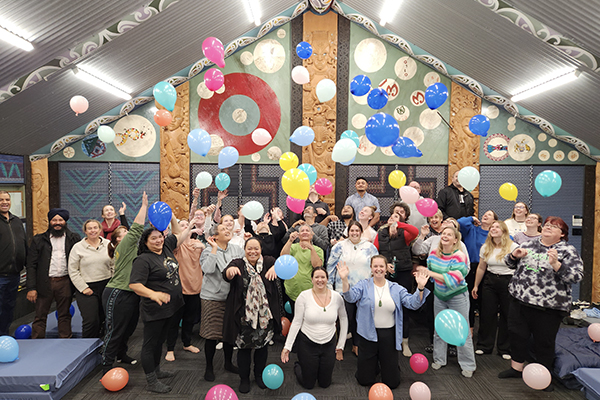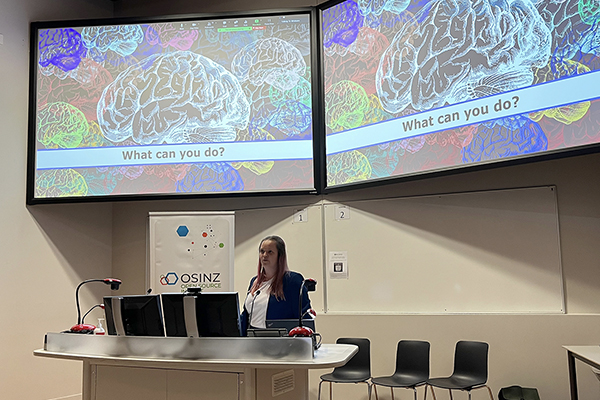Ara Poutama Aotearoa Department of Corrections
Medium-Large Organisation Highly Commended

By normalising different ways of working and increasing people’s capability within neurodiversity, Ara Poutama Aotearoa Department of Corrections has enabled kaimahi to feel safe and confident to share more of their authentic selves and created more capable and responsive leaders.
Corrections is one of the largest government departments in New Zealand, employing around 10,000 staff, most of whom work with offenders in one of 200 locations, including 18 prisons, Community Corrections sites and corporate offices.
Using common prevalence rates, the department is likely to have 500 staff with ADHD, 1,000 dyslexic team members and 185 autistic kaimahi, says Alice Best, Senior Advisor Inclusion and Diversity.
International research suggests 50 to 80 per cent of prison populations are neurodivergent, Amber Rowe, Senior Advisor Inclusion and Diversity and Founder and Chair of Corrections’ Neurodiversity Network says, “This means it is almost certain that all our kaimahi either work with or experience neurodivergent traits every day.
“Therefore, it is essential we uplift capability and responsiveness in this space for both the wellbeing and inclusion for all our kaimahi, as well as for our practice and the people we work with.”
Taking a direction influenced by neurodiverse kaimahi sharing what they need from an employer, the department has launched a series of initiatives in the past two-three years.
These included:
- Establishing an active Neurodiversity Network
- Creating an intranet information hub
- Hosting two annual Neurodiversity Conferences
- Launching a specialised two-hour online and face-to-face training package for staff
- Making sensory kits available across all regions and most sites
- Launching the Hidden Disabilities Sunflower Lanyard scheme
- Delivering Neuroinclusive Recruitment sessions for recruitment teams, hiring managers and panels
- Creating a resource for people leaders and colleagues to better understand individualised ways of working
- Trialling quiet spaces and sensory audits
- Collaborating with internal and external stakeholders
“Working groups of neurodivergent people have been formed across multiple stages in our journey for consultation, feedback, development, and implementation,” Amber says.
The initiatives have been promoted by messaging from the Chief Executive and senior leaders, ongoing education and communications, online events and support from the department’s Inclusion and Diversity team.
“As with any change, there have been some cases of resistance or negativity. These have been discussed at an individual and site level.”
Acknowledging the many factors hindering the collection of data for any community who feel vulnerable and have previously experienced discrimination and bias, Corrections does not record formal metrics on disability and neurodiversity. Amber says the department believes it needs to first make sure it’s created an inclusive space where people feel safe to share their feedback through a survey and trust how the data will be used.

But qualitative data is positive.
A Community Corrections Service Manager says, “Managers at our site are seeing a noticeable difference in engagement, comprehension and less disruptive behaviour and interpersonal conflict since bringing sensory kits into our site. People have realised how much of a difference it makes to themselves, their attendance, and have fed back that they wished they had known about these tools while they were still at school.”
A Lead Service Manager offered this feedback about neuroinclusive recruitment training: “It provided valuable insights, offering practical strategies for accommodating neurodiverse candidates during all stages of the recruitment process. There are some easy quick wins we can put in place to foster a neurodiverse-friendly recruitment process for people looking to join Ara Poutama Aotearoa.”
Kaimahi with neurodiversity also have positive feedback.
“I’ve loved working on the courage to speak up and share struggles and wins, looking into seeking support and diagnosis without fear of negative retribution in the workplace, as well as the little things like practising quiet hour with our site,” says a Probation Officer.
“I’ve been hesitant to openly discuss my ADHD because I’ve felt it’s my problem to deal with, and it’s my responsibility to fit into the broader population. However, after today’s session, I feel much more comfortable about embracing my neurodiversity,” says a National Office Senior Advisor.


